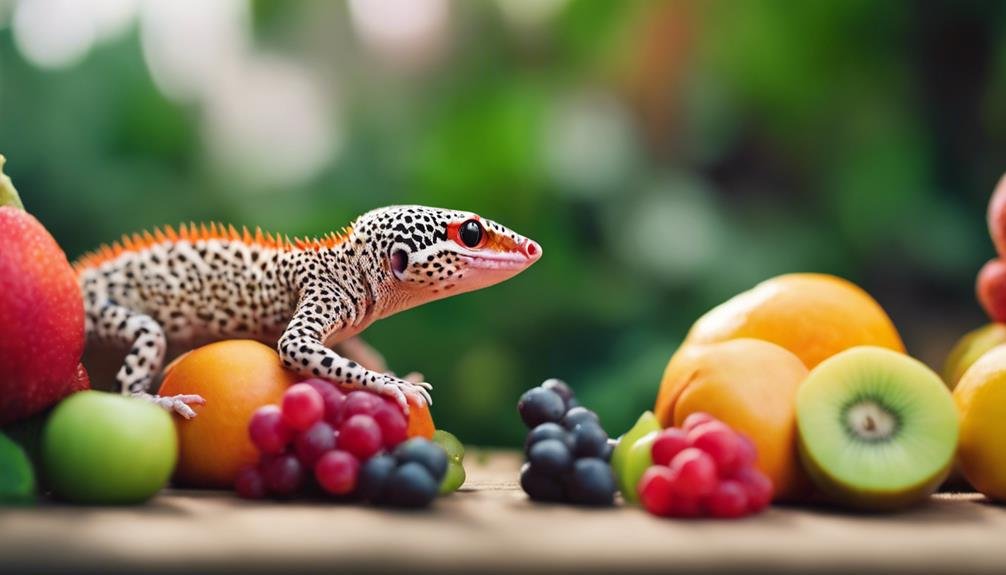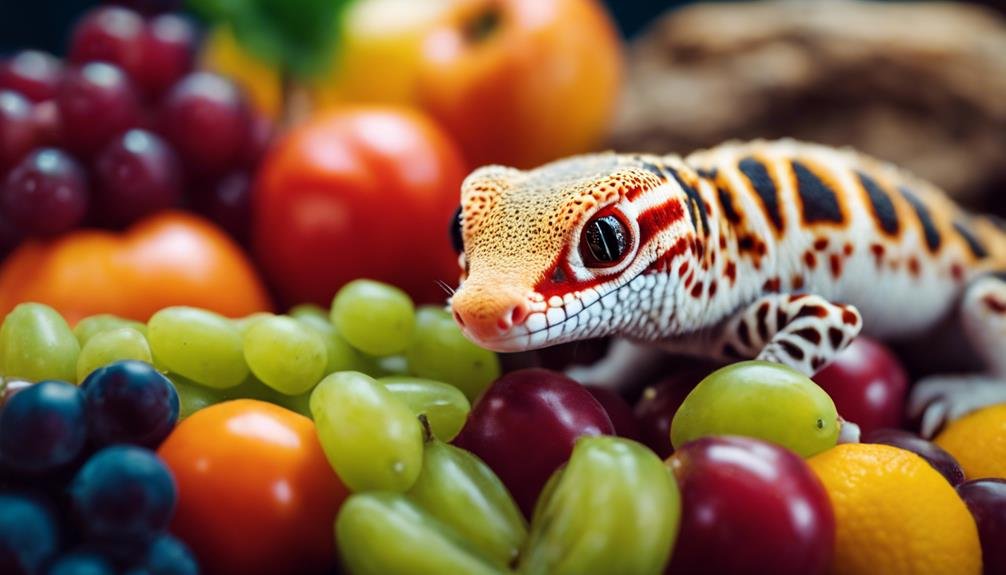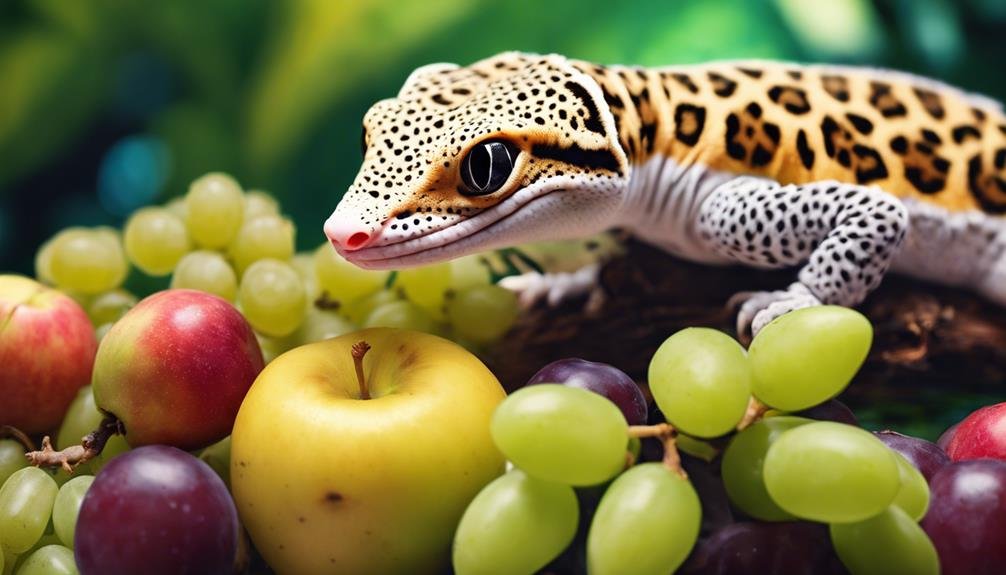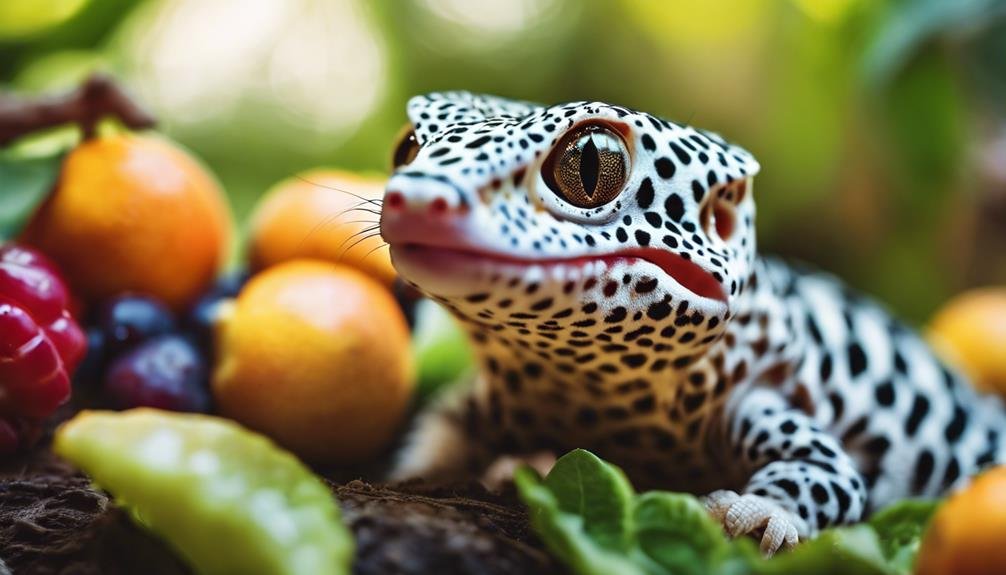You might think offering a slice of fruit to your leopard gecko could be a sweet treat, but it’s a path you’ll want to reconsider. Despite their appealing appearance and the variety of fruits available, these reptiles are ill-equipped to process such foods, leading potentially to a host of health issues that are far from essential. From digestive troubles to severe metabolic bone disease, the risks are real and concerning. So, before you’re tempted to share a fruity snack with your scaly friend, let’s explore why sticking to their insectivorous diet is vital for their health and well-being. What might seem like a harmless indulgence could turn into a toxic nightmare, and there’s much more to uncover about what truly constitutes a safe and nutritious diet for these fascinating creatures.
Key Takeaways
- Leopard geckos primarily eat insects, and fruit can cause serious health issues like digestive problems and obesity.
- Their digestive systems are not designed to process fruit, making it an inappropriate food choice.
- Feeding fruits can lead to metabolic bone disease due to nutritional imbalances.
- Safe dietary choices include gut-loaded insects such as crickets and mealworms, supplemented with calcium and vitamin D3.
- Avocado, citrus, grapes, rhubarb, and cherries are particularly toxic and should be avoided in a leopard gecko’s diet.
Misconceptions About Leopard Geckos and Fruit
Many people mistakenly believe that leopard geckos can eat fruit, but this common misconception can lead to serious health issues for these insectivorous reptiles. It’s important to understand that leopard geckos eat a diet primarily composed of insects. Introducing fruit into their diet isn’t just unnatural; it’s potentially harmful. Feeding them fruit can cause digestive problems, obesity, and even metabolic bone disease due to nutritional imbalances.
This incorrect advice about what leopard geckos eat often misleads new gecko owners, putting their pets’ health at risk. It’s vital to respect the natural dietary preferences of leopard geckos to safeguard their well-being and longevity. Understanding the risks associated with feeding fruit to leopard geckos is a fundamental part of providing proper care and nutrition.
Stick to a diet that mimics what leopard geckos eat in the wild—varieties of insects like crickets, mealworms, and waxworms, which offer the nutritional content they need without the risks that come with fruit. This approach not only prevents health issues but also aligns with their natural eating habits, contributing to a happier and healthier life for your gecko.
The Digestive System of Leopard Geckos
You’ll find that leopard geckos’ digestive systems are uniquely tailored to their carnivorous dietary needs, lacking the ability to process plant matter effectively. Their bodies are equipped to handle the tough exoskeletons of insects and small bones, showcasing significant adaptations in their digestive tract.
This specialization underscores why fruits don’t align with what their bodies are designed to digest efficiently.
Carnivorous Dietary Needs
Understanding the carnivorous dietary needs of leopard geckos is essential, as their digestive system is specifically adapted to process insect-based foods efficiently. Their natural diet consists primarily of insects, which provide the essential nutrients and energy they require for peak health. It’s important to recognize that fruits are not part of their natural diet and offering them can lead to significant digestive issues and nutrient deficiencies. This disruption in their digestive balance impacts their overall well-being, emphasizing the importance of adhering to their natural carnivorous diet for their care.
| Dietary Component | Importance | Impact |
|---|---|---|
| Insects | Provides essential nutrients and energy | Ensures peak health |
| Fruits | Not a natural part of diet | Can cause digestive issues |
| Nutrient Extraction | Efficient in insect-based foods | Maintains health and vitality |
| Digestive Balance | Important for health | Impacted by improper diet |
| Carnivorous Needs | Must be met for well-being | Prevents nutrient deficiencies |
Digestive Tract Adaptations
Leopard geckos possess a simple yet highly efficient digestive system designed for a high-protein, low-fiber diet mainly consisting of insects. Their bodies are finely tuned to process the specific nutrients found in their natural prey, but this specialization comes with certain limitations.
- Short Gastrointestinal Tract: The digestive tract of a leopard gecko is brief, limiting their ability to break down complex carbohydrates and fibers found in fruits.
- Lack of Cecum: Without a cecum, leopard geckos can’t ferment plant materials, making high-fiber fruits hard for them to digest.
- No Specialized Adaptations: They don’t have the necessary adaptations to efficiently process the sugars and fibers in fruits, posing potential health risks.
Health Risks of Feeding Fruits


Incorporating fruits into a leopard gecko’s diet can lead to serious health issues, including digestive problems and obesity. While it might seem like a revitalizing treat, feeding your gecko fruits can actually do more harm than good. Leopard geckos have specific dietary needs, and fruits don’t meet these requirements. Instead of providing vital benefits, a fruit-heavy diet could end up making your gecko sick.
Leopard geckos are primarily insectivores, and their bodies aren’t designed to handle the sugars and other components found in fruits. This mismatch can result in a sick gecko suffering from fatty liver disease or metabolic bone disease, two conditions linked to poor nutrition. These health risks stem from the lack of essential nutrients in fruits that are important for your gecko’s well-being.
Moreover, feeding fruits to your leopard gecko ignores their natural dietary inclinations. In the wild, these creatures wouldn’t opt for fruits, so introducing them into their diet goes against their instinctual eating habits. By respecting their natural needs, you prevent unnecessary health complications and make sure your pet’s diet is as close to what nature intended as possible.
Safe Dietary Choices for Leopard Geckos
You’re on the right path if you’re focusing on insects like crickets, mealworms, and roaches for your leopard gecko‘s meals.
However, it’s important to know which food items could harm them, keeping their diet safe and nutritious.
Let’s explore the ideal insect diet staples and identify what’s unsafe to guarantee your gecko thrives.
Ideal Insect Diet Staples
When selecting an ideal diet for your leopard gecko, consider crickets, mealworms, and roaches as safe and nutritious staple insect choices. Unlike fruits, these insects provide the essential nutrients like protein and calcium that your leopard gecko needs to thrive.
- Gut-loading is key: Enhance the nutritional value of these insects by gut-loading them with nutritious foods before feeding them to your gecko.
- Variety matters: Offering a range of insects helps prevent dietary deficiencies and guarantees a balanced diet.
- Supplement with calcium: Calcium supplements are essential for maintaining strong bones, especially in a diet that’s heavily insect-based.
Unsafe Food Items
While it’s important to focus on what leopard geckos can eat, it’s equally essential to know which foods to avoid to keep them healthy and thriving. Fruits, often considered healthy for humans, present potential health risks for your gecko. Here’s a quick guide to help you steer clear of unsafe food items:
| Unsafe Food | Reason to Avoid |
|---|---|
| Fruits (e.g., bananas) | Can cause digestive problems |
| Standard pet food (dog/cat food) | Not nutritionally suitable |
| Raw meat | Risk of parasites and bacteria |
| Dairy products | Cannot be digested properly |
Offering a diet rich in suitable insects like crickets, mealworms, and roaches, and avoiding fruit, ensures your leopard gecko receives the nutrition it needs without the risks.
Common Toxic Fruits to Avoid


Several fruits pose significant health risks to leopard geckos, including avocados, citrus fruits, grapes, rhubarb, and cherries, due to various toxic substances they contain. When you’re invested in leopard gecko care, being aware of what not to feed them is just as important as knowing their dietary needs. These fruits, while seemingly harmless, can lead to severe health issues or even prove fatal for your pet.
To make sure you’re providing the best care, here’s a quick list of fruits to avoid:
- Avocado: Contains persin, a substance that’s toxic to leopard geckos, potentially causing digestive issues and, in severe cases, death.
- Citrus Fruits (like oranges and lemons): Their acidity can disrupt your gecko’s digestive system, leading to discomfort and health complications.
- Grapes: High in oxalates, they can bind calcium and contribute to metabolic bone disease, a critical concern in leopard gecko care.
Additionally, rhubarb, with its oxalic acid, and cherries, particularly their pits which contain cyanide compounds and pose a choking hazard, are equally harmful. Steering clear of these fruits will help you maintain a healthy and safe diet for your leopard gecko.
Nutritional Supplements and Alternatives
To promote your leopard gecko’s bone health, it’s crucial to include nutritional supplements like calcium and vitamin D3 in their diet. While fruit might seem like a tempting treat, it isn’t suitable for your gecko. Instead, turning to these supplements can guarantee they’re getting the nutrients they need without the risks.
Gut-loading insects with nutritious foods before feeding them to your gecko is a great way to pass on important nutrients. This process involves feeding the insects healthy foods, which then get passed on to your gecko when they eat the insects. It’s a natural way to boost their diet with essential vitamins and minerals.
Furthermore, commercially available insect powders can be dusted onto insects as a convenient alternative. These powders are specially formulated to meet the nutritional needs of leopard geckos, providing a balanced blend of vitamins and minerals with every meal.
For a well-rounded diet, consider offering occasional waxworms or other insect treats. These can be great alternatives to fruit, ensuring your gecko maintains a balanced diet while avoiding any potential health risks associated with inappropriate treats.
Understanding Reptile Nutrition


Understanding the nutritional needs of reptiles, like leopard geckos, is key to ensuring they thrive under your care. Leopard geckos are naturally inclined to eat insects, which provide them with the essential nutrients they need for a healthy life. Fruits, though tempting as a treat, don’t align with their dietary requirements and can lead to significant health issues.
To maintain the well-being of your leopard gecko, consider the following:
- Primary Diet: Leopard geckos are insectivores. Their diet should mainly consist of insects like crickets, mealworms, and roaches. These insects offer the right balance of nutrients, including proteins and fats, critical for their health.
- Health Risks of Fruit: Introducing fruit into their diet can cause digestive problems and obesity. Leopard geckos’ digestive systems aren’t designed to process fruit sugars and fibers effectively, leading to potential health complications.
- Dietary Mimicry: Mimicking their natural diet as closely as possible is essential. This means focusing on insects and appropriate supplementation to ensure they receive all necessary nutrients.
Respecting and understanding the dietary needs of leopard geckos are fundamental. By focusing on insects and avoiding fruits, you’ll provide a diet that’s not only natural but also beneficial for their health.
Engaging the Reptile Community
While we’ve explored the dietary needs of leopard geckos, it’s equally important to contemplate how sharing this knowledge can benefit the reptile community at large. Engaging with the community through comments isn’t just about swapping stories; it’s a way to deepen our understanding and guarantee our scaly friends thrive.
Comments serve as a vibrant forum where you can share your experiences, whether it’s about offering fruit as a treat or managing your pet’s overall diet. It’s in these digital spaces that you’re likely to stumble upon a nugget of wisdom that could make all the difference in your reptile care routine.
Is It Safe to Feed My Leopard Gecko Dubia Roaches as a Treat if They Can Eat Fruit?
Yes, it is safe to feed your leopard gecko Dubia roaches as a treat, even if they can eat fruit. However, it’s important to remember that fruits should only be given sparingly as part of a balanced diet. For more leopard gecko diet tips, consult with a reptile specialist.
Frequently Asked Questions
What Fruits Are Toxic to Leopard Geckos?
When choosing fruits for your leopard gecko, you’ve got to be careful because not all are safe. Avocados are a big no-no, as they’re toxic.
You’ll also want to steer clear of citrus fruits like oranges, lemons, and limes due to their acidity.
Grapes, raisins, and rhubarb? All harmful because of toxins and oxalic acid.
And don’t even think about cherries, especially the pits and stems; they can be poisonous.
What Is a Leopard Geckos Favorite Treat?
You’re probably wondering about a leopard gecko’s favorite treat, given their insect preferences. It’s generally waxworms! These treats are like candy for them due to their high-fat content, making them an irresistible choice.
However, you’ve got to use them sparingly. Feeding waxworms too often can lead to obesity in your gecko. So, while they love these tasty morsels, remember moderation is key to keeping your scaly friend healthy and happy.
What Is Bad for Leopard Geckos?
You should know that aside from avoiding fruit, improper lighting is bad for leopard geckos. These creatures need specific lighting requirements to mimic their natural habitat and maintain a healthy circadian rhythm.
Providing the wrong type or intensity of light can stress them out, leading to health issues.
Always make sure their habitat has the right balance of light and darkness, avoiding bright, unnatural lights that can harm their well-being.
What Is the Healthiest Food for Leopard Geckos?
You’re looking for the healthiest food for your leopard gecko, and the answer lies in a diet rich in insect variety. Crickets, mealworms, and roaches should be your go-to, providing the essential nutrients they need.
While fruits can be a treat, they shouldn’t replace these crucial insects. Incorporating chicken and carrot baby food occasionally can also boost their protein and vitamin A intake, ensuring your gecko stays healthy and vibrant.
Conclusion
So, you’ve learned that feeding fruits to leopard geckos is more of a toxic nightmare than a healthy treat. Their bodies just aren’t built to handle it, leading to serious health issues.
Stick to their natural insectivorous diet, and avoid the temptation to offer fruits, no matter how harmless they seem. Embrace nutritional supplements and safe dietary choices to keep your gecko happy and healthy.
Remember, understanding and respecting their nutritional needs is key to a long, vibrant life for your reptile friend.


